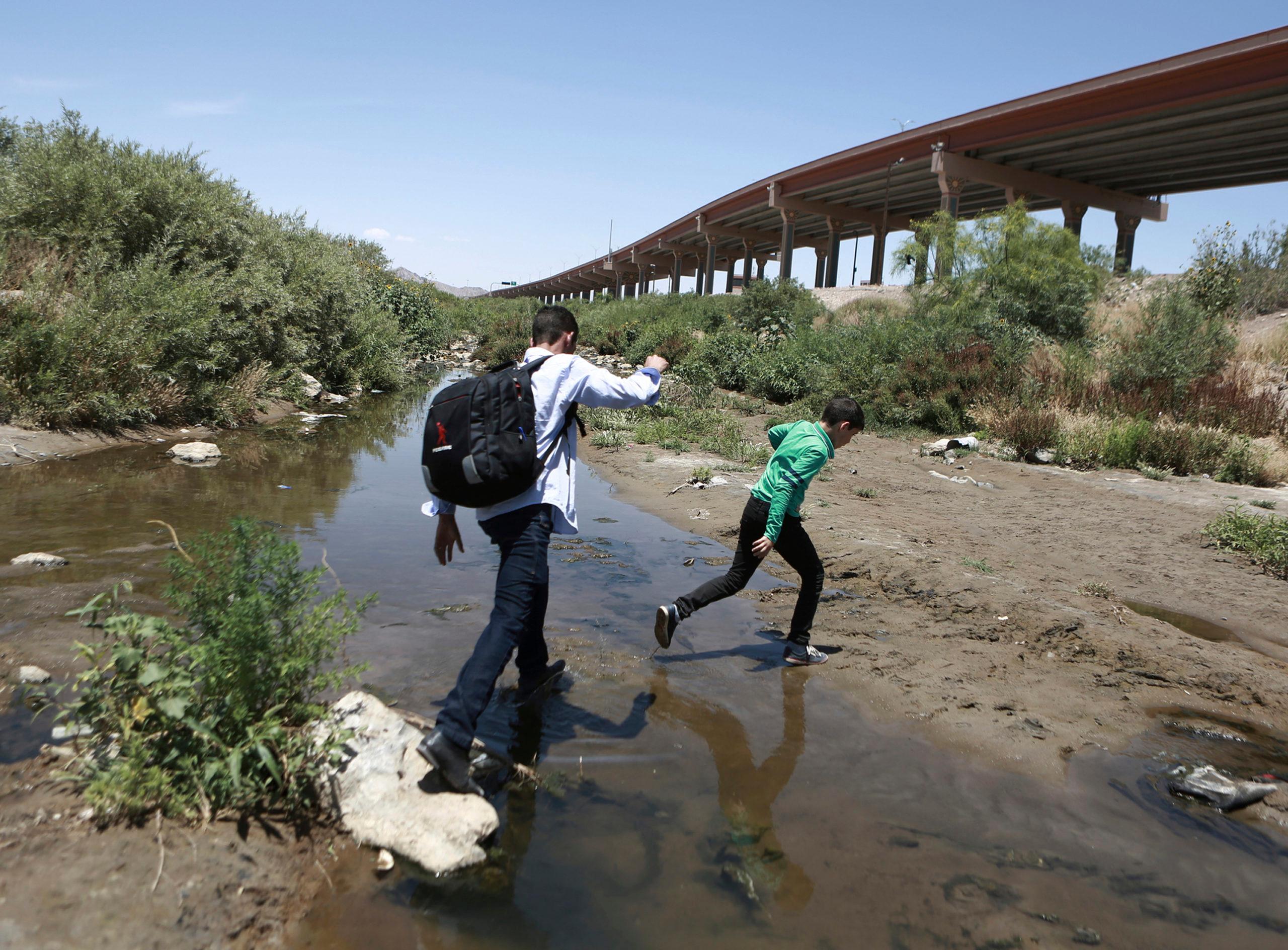
The number of immigrant children who enter the United States without their parents and then are released to family members in Colorado has grown more than 125 percent in the past year.
Most of the unaccompanied immigrant children now live in Arapahoe County, according to data from the Office of Refugee Resettlement (ORR). The number of children released to Arapahoe County nearly tripled from 62 in fiscal year 2018 to 170 in fiscal year 2019. The next four Colorado counties with the highest numbers are Denver (94), Weld (75), El Paso (70), and Adams (55). Other counties in the state may also have unaccompanied immigrant children, but the ORR does not publish data for counties if there are less than 50 such children.
In total in Colorado, more than 700 children were released to sponsors last fiscal year.
"The vast majority of them, their parents or grandparents that they were living with made the decision that sending this child on a very dangerous and long journey up through Central America and Mexico across the United States border facing all of the dangers involved is actually safer for them than remaining at home," said Ashley Harrington, head of the children's department at the Rocky Mountain Immigrant Advocacy Network, or RMIAN. "That if they stay home, they will be killed or they will be raped or they will be forced into recruitment by the gangs."
By federal law, the ORR is responsible for housing or detaining unaccompanied children long term. Immigration and Customs Enforcement is required to turn these children over to ORR within 72 hours. ORR is under the umbrella of the U.S. Department of Health and Human Services, not any law enforcement agency.
ORR runs both large warehouse-like facilities near the border and small group-home shelters across the country. The department is considering opening a shelter for unaccompanied minors in Colorado, according to Harrington. It would be the first of its kind in the state and would be located on the Front Range.
This kind of shelter would house children until they could be released to a sponsor family.
The ORR also operates jail-like facilities. They say those facilities hold children with criminal histories and gang affiliations.
How does an unaccompanied child end up in Colorado?
To qualify as what the federal government calls an "Unaccompanied Alien Child," someone under the age of 18 either presents themselves to immigration authorities at a port of entry or is detained while crossing the border without a parent who can prove their custody of the child.
"There are many cases where children or individuals tried to present themselves at the port of entry and then are turned away and then take the other route of trying to go across the river or the desert or whatever," Harrington said.
That means grandparents, siblings, and even parents without proof of their relation could be separated from the child. That child is then transferred to the custody of ORR and put into a shelter or detention facility for minors.
"Their caseworkers are working very hard to try to reunify that child with an adult that's willing to take care of the child here in the United States," Harrington said.
That might be mom or dad, it might be an older brother or sister, aunt or uncle, or a family friend in Colorado. This sponsor must be willing to submit their fingerprints and an application that says they will care for the child and ensure they show up for deportation proceedings in immigration court.
Harrington has found that fewer people are volunteering to be sponsors. There's no legal requirement that sponsors be citizens or green card holders, but she said a Trump administration policy that shares fingerprints between the ORR and Immigration and Customs Enforcement has scared off potential caretakers.
"A couple of summers ago, many sponsors were picked up by ICE because they had submitted their fingerprints to try to take care of a child to try to sponsor a child," Harrington said. "It's really had a chilling effect on folks' willingness and ability to come forward."
Children who get labeled as "Unaccompanied Alien Children" get a couple of benefits that other immigrant children don't. Children not from Mexico or Canada can't be put on an expedited removal track or given the option to self-deport. They also have the right to apply for relief, present evidence in court and apply for asylum through U.S. Citizenship and Immigration Services as opposed to through the court.
Still, Harrington said more and more restrictions are being used to stop courts from pausing immigration cases while children seek legal status outside of legal proceedings.
There are some children who don't have anyone in the U.S. who is willing or able to care for them. Some potential sponsors don't pass review by the ORR or aren't comfortable submitting their fingerprints to the federal government.
Some of those children end up in long-term foster care. A small percentage are transferred to the Unaccompanied Refugee Minor program. Still others remain in an ORR facility throughout their immigration case, Harrington said.
Denver is one of 20 cities that have Unaccompanied Refugee Minors.
Colorado doesn't have any long-term foster care facilities for these children, according to Harrington. But there's a possibility some children released to sponsors who are later determined to be unfit to care for these children might end up in foster care in Colorado. It's unclear who collects data on those children.
RMAIN works to get unaccompanied immigrant children with possible eligibility classified as unaccompanied refugees. They get a few more protections from deportation through that program.
They also work to get lawyers for unaccompanied immigrant children living with sponsors.
"We hear the same stories day in and day out about what these kids are going through primarily in Guatemala, Honduras, and El Salvador and it's absolutely horrific," Harrington said.
The most common story for boys RMAIN works with is that they face pressure to join gangs in some of these countries starting at age 11 or 12.
"[They're] told basically, 'You need to work for us, you need to sell drugs for us, you need to kill people for us or rob for us, hurt people for us, or you will be killed. Your mother will be killed, your little sister will be killed,'" Harrington said. "They know their classmates or their neighbors or their friends or their cousins who tried to say no, who tried to say, "I want to go to school, I want to go to church, I want to have a good life. I don't want to be a gang member that they are killed and their family members are killed."
According to RMAIN, the story for girls has more to do with sexual involvement with gang members.
The immigration process for immigrant children in Colorado
It has become more difficult in the last year or two for these children to get asylum, Harrington said.
"Unfortunately, our asylum laws don't really match what's going on right now and it's very difficult to win an asylum claim, particularly fleeing the gangs in Central America right now," she said.
But RMAIN and other immigrant advocacy groups don't have enough resources to represent every immigrant child in deportation proceedings. The federal government does not require court-appointed lawyers for immigrants, child or not.
"So children as young as 2, 3, 5, 10 years old are forced to go forward in immigration court alone and try to apply for asylum — meet the very complicated and difficult legal requirements for asylum — alone without an attorney," Harrington said. "While on the other side you have an attorney representing immigration and customs enforcement prosecuting the case."
If a judge denies a child's asylum plea, they are deported.
Why has the number of these children in Colorado doubled?
This population of children released has more than doubled nationwide as well. The only state that didn't see an increase last fiscal year was Montana. And Harrington doesn't see it getting better.
"Things just continue to get worse and worse in Guatemala, Honduras, and El Salvador, so no matter what punitive policies we pass, no matter what horrors we do to children when they come to this country, they will continue to flee," she said.
It appears Colorado is following the national trend. If there is anything that sets Colorado apart from other states, it's unclear, Harrington said.
"I hope that it's because sponsors are feeling less fearful of coming forward to take care of children here in Colorado than in other areas of the country, but I really don't know," Harrington said.









